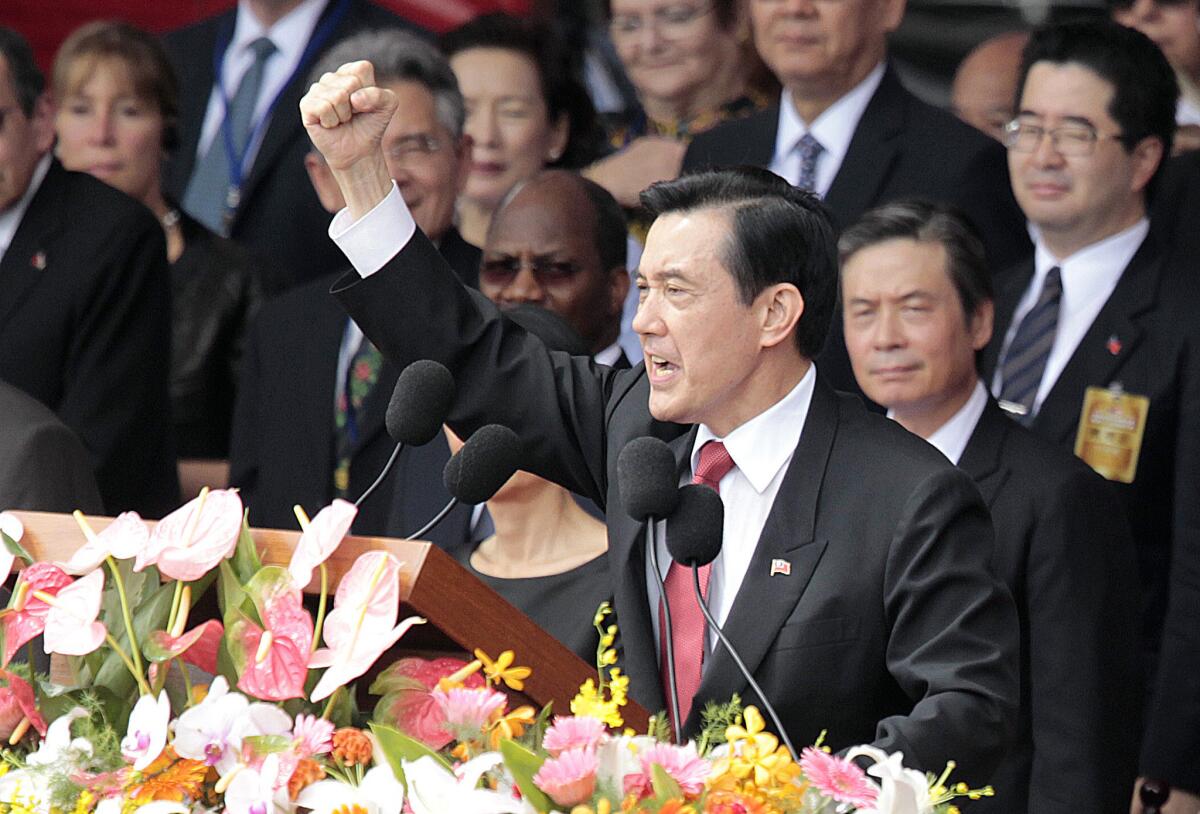Taiwan’s leader urges China to wade into democracy, Hong Kong-first

- Share via
Reporting from Taipei, Taiwan — Taiwanese President Ma Ying-jeou, in an unusual criticism of the Communist Party leadership in Beijing, said Friday that China should embrace democracy, and start by allowing free elections in Hong Kong.
Ma is often viewed at home as too friendly toward China, but his comments reflect local support for the tens of thousands of Hong Kong residents who launched democracy protests Sept. 27 in the semiautonomous Chinese territory, where they have shut down streets for more than a week.
“Thirty years ago, when Deng Xiaoping was pushing for reform and opening up in the mainland, he famously proposed letting some people get rich first,” Ma said in his speech on Taiwan’s National Day, referring to the economic reformist who ruled China from 1978 to 1992. “So why couldn’t they do the same thing in Hong Kong, and let some people go democratic first?
“Now that the 1.3 billion people on the [Chinese] mainland have become moderately wealthy, they will of course wish to enjoy greater democracy and rule of law. Such a desire has never been a monopoly of the West, but is the right of all humankind,” Ma said.
China regained sovereignty over Hong Kong from Britain in 1997, pledging a “one country, two systems” form of rule that would give the world financial center a high degree of autonomy for 50 years. Authorities in Beijing have long advocated the same kind of model to reunite Taiwan with the mainland.
Taiwan, 100 miles off China’s southeastern coast across the Taiwan Strait, is ethnically Chinese but has been self-governed since the 1940s. Beijing maintains a claim of sovereignty over the island of 23 million and has threatened to take it by force.
Ma’s support for Hong Kong protesters illustrates a sense of urgency among many Taiwanese to resist reintegration with China even as the two sides negotiate trade and investment deals, which some fear will allow Beijing to control the island.
“Taiwanese are afraid that if you can’t sustain ‘one country, two systems’ in Hong Kong, then it wouldn’t work here, and that’s why Taiwan is paying attention,” said Ku Chung-hua, 58, a standing board member of Citizen Congress Watch, a group that monitors Taiwan’s Legislature. “The Hong Kong problem makes people here think ‘one country, two systems’ is a deception.”
Ma’s comments follow a call from Taiwan’s chief opposition party to allow democratic elections in Hong Kong. Since the Hong Kong demonstrations began, two rallies — one exceeding 3,000 people — have been held in Taipei, Taiwan’s capital, to show support for the protesters.
On the issue of ties with the mainland, Ma has often stood apart from the opposition and protest groups, seeking to ease tension and build economic ties with Beijing. But his government’s China policy body said last week that Beijing should seek consensus with Hong Kong on how to run the territory. About 70% of Taiwanese oppose being ruled Hong Kong-style under Beijing, the agency said.
“The difference in attitudes between the two political parties is not that different,” Ku said.
Taiwanese say they must flex their democratic credentials in front of the more militarily powerful China to make it clear that they do not want to follow Hong Kong’s style of government.
“For every government of Taiwan, it is always extremely urgent and necessary to keep the fruits of independence and democracy from being pressurized by the forced integration initiated from across the strait,” said Huang Kwei-bo, associate professor of diplomacy at National Chengchi University in Taipei.
China has claimed Taiwan as its own since Mao Tse-tung’s Communists routed Chiang Kai-shek’s Nationalists in the Chinese civil war of the 1940s. The Nationalists fled to Taiwan, set up a rival government and allowed democracy in the 1980s.
That split with China cut off most relations until 2008, when Ma took office and shelved political disputes to open the first talks on trade and investment deals. The 21 agreements signed since then lifted two-way trade to $124 billion last year, making China Taiwan’s top trading partner, and have brought millions of mainland Chinese tourists to the island’s thirsty services sector.
Still, many Taiwanese want Ma to keep some economic distance from China.
“The economic goodwill is just on the surface,” said Lai Chung-chiang, a Taipei law firm partner who founded an advocacy group to monitor Taiwan-China agreements. “In Taiwan and Hong Kong we are facing a common threat, which is the Beijing government.”
Ma on Friday offered to share the ins and outs of democracy with China, adding that the development of democracy isn’t something that comes with a “plug-and-play formula.”
Allowing democracy in Hong Kong, the president said, “would be a huge boost for the development of cross-strait relations.”
Jennings is a special correspondent.
More to Read
Sign up for Essential California
The most important California stories and recommendations in your inbox every morning.
You may occasionally receive promotional content from the Los Angeles Times.













